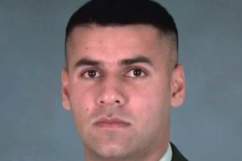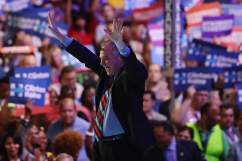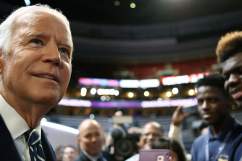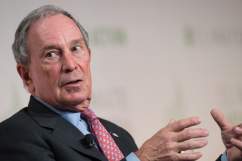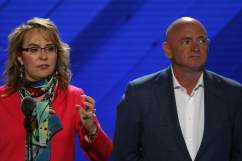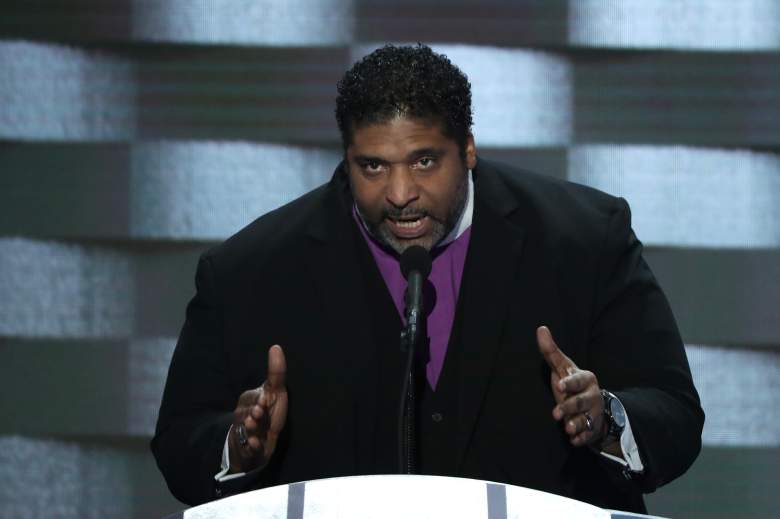
Rev. Dr. William J. Barber II electrified the DNC crowd on Thursday with a rousing call to action. (Getty)
The Rev. Dr. William J. Barber II, 52, is known in North Carolina for creating Moral Mondays, weekly protests against controversial laws signed by Governor Pat McCrory. The protests have inspired similar ones around the country and earned Barber a slot at the Democratic National Convention on Thursday.
Barber, who has been the president of the North Carolina NAACP since 2006, grew up with activist parents and he called on Democrats in Philadelphia to “not give up on the heart of our democracy, not now, not ever.” For 10 minutes, he had the crowd’s undivided attention, telling Democrats that they are the “moral defibrillators of our time.”
Here’s a look at Barber’s life and career.
1. Barber’s Parents Were Activists Who Helped Integrate North Carolina Schools
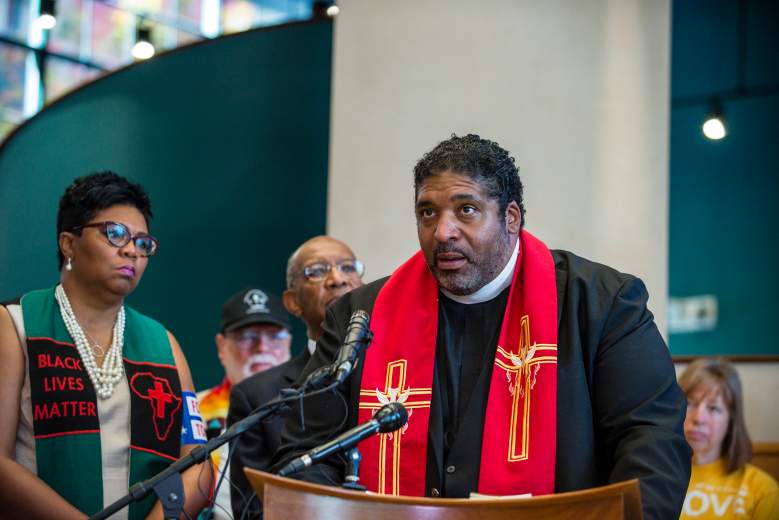
Barber marched before the Republican National convention in Cleveland. (Getty)
Barber was born in Indianapolis, but his parents decided to move back to Washington County, North Carolina when he was an infant. They sought to help integrate schools in his father’s home state. So, his father was the first African-American teacher in Washington County’s general science department. His mother worked in the school office, becoming the first African-American to hold the manager position. Barber’s father was also a pastor and would hold meetings in their house.
Barber said in a 2013 interview with Indy Week:
My parents both had college degrees, and in the 1950s and ’60s that was pretty good for African-Americans at that time. They had the opportunity to stay in Indiana and basically move on up in their jobs. But they made a decision to take their only child at that time, come back here to my father’s hometown and enter me into segregated kindergarten.
Barber was born just two days after Martin Luther King’s famous March on Washington. In the Indy Week interview, Barber said that the image of King’s murder has stayed with him, even though he was only 5 years old at the time.
I remember my mother just screaming in the house and seeing her looking at this black and white TV sitting up on the refrigerator. Now I know what that was, was when Dr. King was shot. My mother was bent over and my daddy came in crying. It was so dramatic.
2. Barber Started the Moral Mondays in 2013 to Protest Republican Policies
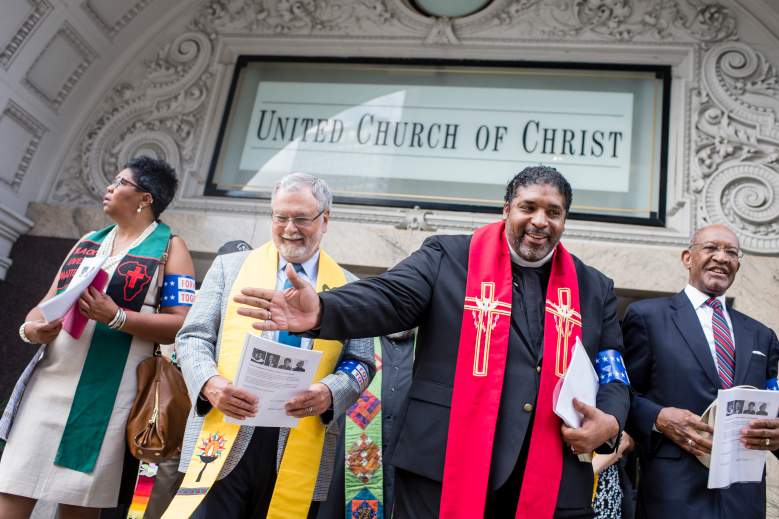
(Getty)
After Republicans gained control of the governor’s office and the state legislature in North Carolina, Barber and the North Carolina NAACP began organizing Moral Mondays protests. Even after McCrory called them “illegal,” the protests continued. THe governor would not meet with the protesters.
“Maybe it’s because he can only defend his policies and the policy of his legislators within the echo chamber of the tea party,” Barber told WRAL.
Barber told Mother Jones in 2014 that changes to election laws, including stopping same-day registration and requiring IDs, was the last straw. “That’s when a group of us said, ‘Wait a minute, this has just gone too far,'” Barber said.
Moral Mondays-style movements sprouted throughout the South, in Florida, Georgia, Alabama and South Carolina.
3. Barber Said the ‘Transgender Bathroom Bill’ is ‘Not Really a Bathroom Bill… This Is a Hate Bill’
In March 2016, McCrory signed the controversial House Bill 2. Part of the bill includes forcing transgender people to use public restrooms that match the gender on their birth certificate. Barber was quick to criticize the law. He told Democracy Now:
This is not really a bathroom bill. That’s the part we have to get to the public. This is a hate bill, where the transgender community is being used the same way that Jesse Helms used gay people and race in ’84, when he was 40 points down in the polls and he was running against Jim Hunt. This is a poisonous brew. It’s old-line, again, white Southern strategy politics.
“It’s almost sad that they’re living in a historical time warp and they believe that they can run these little wedge issues and people can’t see through them,” Barber said in a Washington Post interview.
The bill is the reason why the NBA pulled the 2017 All-Star Game from Charlotte. Instead, Charlotte will host the 2019 game.
4. Barber Was Once Removed From an American Airlines Flight After Someone Complained About Him
Barber was diagnosed with ankylosing spondylitis in his 20s. It’s an arthritic condition that affects the spine and he used to need a walker, Mother Jones notes. Since he knows the importance of health care, he calls it “immoral” when someone is denied health insurance. “The logic doesn’t compute,” he told Mother Jones about the politicians who want to block Obamacare.
Barber still faces struggles with his disability. He has to buy two seats on a plane. In April, he was flying back to North Carolina after speaking at the Ecumenical Advocacy Days in Washington DC when someone complained about his need for two seats. In a statement about the incident, Barber wrote:
The attitude with which he spoke, and my experiences with others who have directed similar harsh, sometimes threatening words, emails, and calls at me, came to my mind. Because he was behind me when he made the comments and because of my disability, the only way I could see him when I tried to speak to him as one human being to another was to stand and turn around. I asked him why he was saying such things, and I said he did not know me, my condition, and I added I would pray for him.
However, the American Airlines attendants told Barber that he had to leave the plane, even as they expressed disappointment with him having to leave. He agreed to though and got another flight back to North Carolina without a problem. Barber did not want the situation getting extra attention. He wrote:
I want to emphasize, virtually all who had to implement the decision to remove me from the plane were embarrassed and upset by it. I thank them, and thank all my friends for the words of comfort and love, and your prayers. Now, let’s get back to work, changing attitudes, stereotypes, perceptions, policies and dealing with people’s fears and hatred.
5. He Called on Voters to ‘Revive’ The Heart of American Democracy
During his speech on Thursday, Barber presented a metaphor, saying that voters are the “defibrillators” that can “revive the heart of American democracy.”
“When we love the Jewish child and the Palestinian child, and the Muslim and Buddhist, and Christian and those who have no faith but love this nation we are reviving the heart of this democracy,” Barber told the audience at the DNC, earning loud applause.
He later said, “In times like these we have to make some decisions, and I might not normally be here, I hear Hillary’s voice and I know we should embrace her.”
In a March op-ed for The Nation, Barber told the media to ask candidates “deep moral questions.” Barber wrote:
Ask them how they “manage to keep their integrity” when 500,000 low-income North Carolinians—including roughly 30,000 veterans—have no health insurance because Governor Pat McCrory and the legislature have chosen not to expand Medicaid. Medical authorities at UNC Hospitals estimate that as a result of this immoral choice, each year 2,500 North Carolinians will die unnecessarily due to lack of healthcare. Most will die because a lack of preventive care leads to needless strokes and heart attacks. Ask them why they place their political ideology over human needs.
